Infocom was an American software company based in Cambridge, Massachusetts, that produced numerous works of interactive fiction. They also produced a business application, a relational database called Cornerstone.
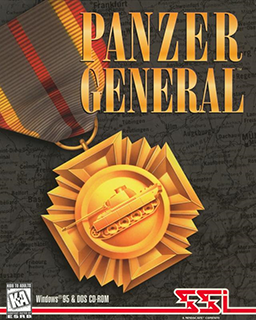
Panzer General is a 1994 computer wargame developed and published by Strategic Simulations Inc. (SSI). It simulates conflict during World War II. The designers of Panzer General were heavily influenced by the Japanese wargame series Daisenryaku.
The Operational Art of War (TOAW) is a series of computer wargames noted for their scope, detail, and flexibility in recreating, at an operational level, the major land battles of the 20th century. A Norm Koger design, TalonSoft published the first of the series in 1998. Matrix Games bought the rights to the franchise and created a new game in 2006, TOAW 3, which was the first non-Norm Koger designed game in the series.

Planetfall is a science fiction themed interactive fiction video game written by Steve Meretzky, and published in 1983 as the eighth game from Infocom. The original release was for Apple II, Atari 8-bit computers, TRS-80, and IBM PC compatibles. Atari ST and Commodore 64 versions were released in 1985. A version for CP/M was also released. Planetfall was Meretzky's first published game, and it proved one of his most popular works and a best-seller for Infocom. It was one of five top-selling games to be re-released in Solid Gold versions with in-game hints. Planetfall uses the Z-machine originally developed for Zork and was added as a bonus to the Zork Anthology.

Enchanter is an interactive fiction game written by Marc Blank and Dave Lebling and published by Infocom in 1983. The first fantasy game published by Infocom after the Zork trilogy, it was originally intended to be Zork IV. The game has a parser that understands over 700 words, making it the most advanced interactive fiction game of its time. It was Infocom's ninth game.

Seastalker is an interactive fiction game written by Stu Galley and Jim Lawrence and published by Infocom in 1984. It was released simultaneously for several popular computer platforms of the time, such as the Commodore 64, Apple II, and IBM PC compatibles. The game was marketed as an introduction to interactive fiction for preteen players, having difficulty rating of "Junior." It was the only game to ever use this rating, which was replaced by the "Introductory" label given to games such as Wishbringer. It is Infocom's twelfth game.

Moonmist is an interactive fiction game written by Stu Galley and Jim Lawrence and published by Infocom in 1986. The game was released simultaneously for the Amiga, Amstrad CPC, Apple II, Atari 8-bit computers, Atari ST, Commodore 64, MS-DOS, TRS-80, TI-99/4A, and Mac. It is Infocom's twenty-second game. Moonmist was re-released in Infocom's 1995 compilation The Mystery Collection, as well as the 1996 compilation Classic Text Adventure Masterpieces.

The PC-9800 series, commonly shortened to PC-98 or 98, is a lineup of Japanese 16-bit and 32-bit personal computers manufactured by NEC from 1982 to 2000. The platform established NEC's dominance in the Japanese personal computer market, and, by 1999, more than 18 million units had been sold. While NEC did not market these specific machines in the West, it sold the NEC APC series, which had similar hardware to early PC-98 models.
Classic Text Adventure Masterpieces of Infocom is a collection of 33 computer games from interactive fiction pioneer Infocom, and the top 6 winners of the 1995 Interactive Fiction Competition, released in 1996. All 39 games are combined on a single cross-platform CD-ROM, which also includes PDFs of all the Infocom games' instructions, maps, and hint booklets.

Genghis Khan, original full title Aoki Ōkami to Shiroki Mejika: Genghis Khan (蒼き狼と白き牝鹿・ジンギスカン), is a 1987 turn-based strategy game developed by Koei, originally released for the NEC PC-9801, MSX and Sharp X68000 in 1988, the DOS and NES in 1990, and the Amiga in 1990. It is actually the second game in the series, after a 1985 Aoki Ōkami to Shiroki Mejika, also for PC-88, PC-98, and MSX.
System Sacom (システムサコム), also known as System Sacom Sales Corp., is a Japanese company which sells electronic devices. They are more notable for their past, in which they developed video games. In the 1980s, they mainly published games for computers, but they changed focus to home consoles in the 1990s. Its head office is located in Tokyo.
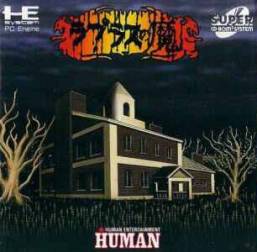
Laplace no Ma is a Japanese video game released in 1987 for the NEC PC-8801 and NEC PC-9801. The game was also ported to Sharp X68000, MSX, the SNES and TurboGrafx-CD. It is part of the Ghost Hunter dungeon crawler series, which also includes Kurokishi no Kamen for the 3DO and Paracelsus no Maken for the NEC PC.

Hydlide is an action role-playing game developed and published by T&E Soft. It was originally released for the NEC PC-6001 and PC-8801 computers in 1984, in Japan only; ports for the MSX, MSX2, FM-7 and NEC PC-9801 were released the following year. A Nintendo Switch port based on the PC-8801 version was released on December 21, 2023 by D4 Enterprise.

Daisenryaku is a series of war strategy video games by SystemSoft and SystemSoft Alpha in Japan. The series debuted in Japan in 1985 with Gendai Daisenryaku exclusively for the NEC PC-98.

Master of Monsters is a turn-based strategy game developed by SystemSoft for the MSX and NEC PC8801. It was ported to a variety of consoles and PCs including the PC Engine CD, NEC PC9801, and Sega Genesis/Mega Drive. While it never had the same success as its SystemSoft stablemate Daisenryaku, the game garnered a loyal following. Its success in the North American market on the Sega Genesis proved sufficient for a sequel on the Sega Saturn, and an anime art-style enhanced Sony PlayStation version titled Disciples of Gaia with a Japanese role-playing game feel. Master of Monsters: Disciples of Gaia was released in 1998.
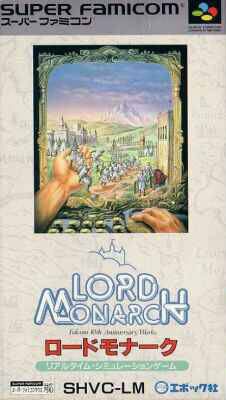
Lord Monarch is a real-time strategy war game by Nihon Falcom. The game is considered to be part of the Dragon Slayer series. It was originally released in 1991 for the NEC PC-9801, ported 1992 to the Super Famicom and 1994 to the Mega Drive. In 1997, it was remade for Windows as Lord Monarch Online and released for free in both Japanese, and for the first time, English. Lord Monarch is one of the 42 titles included in the Japanese version of the Mega Drive Mini.
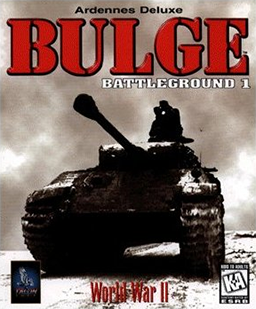
Battleground: Ardennes is a 1995 computer wargame developed and published by TalonSoft. It the first game in the Battleground series
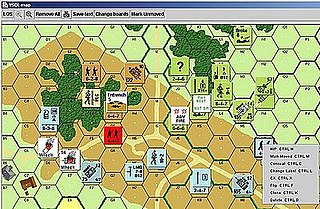
A computer wargame is a wargame played on a digital device. Descended from board wargaming, it simulates military conflict at the tactical, operational or strategic level. Computer wargames are both sold commercially for recreational use and, in some cases, used for military purposes.
Battleground is a series of turn-based computer wargames developed and published by TalonSoft for Microsoft Windows between 1995 and 1999. Nine games were released in the series, each based on a different historical battle.

Rising Sun is a 2000 computer wargame developed by TalonSoft and published by Take-Two Interactive. Set during the Pacific War, it is an entry in TalonSoft's Campaign series.














